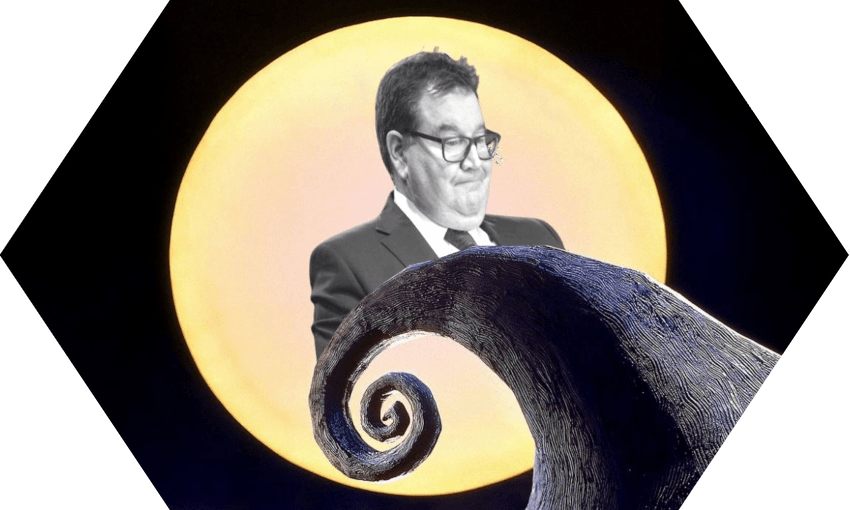A grinchy seasonal message from the central bank makes a tough task tougher for Labour, and gave National the chance to tear a target from its own back.
Adrian Orr went full Grinch yesterday. Had it been in his power, the Reserve Bank governor would most likely have mandated a nationwide $5 limit on all Christmas presents. Instead he said, “may you have a wonderful and sensibly-spending Christmas” and thwacked up the base rate by 75 points to 4.25%, the biggest jump on record, in an attempt to tame the greater curse of soaring inflation.
That didn’t surprise anyone. What really sucked the Christmas spirit out of the room was the outlook for next year. It looked a lot like the actual weather forecast for much of the country right now: rainstorm after rainstorm after rainstorm. The OCR rising further, to 5.5%, propelling mortgages up towards the 8% mark. Sticky inflation. Worrying unemployment rates heaving back into view. And recession. Shallow, hopefully, but real – a consistent shrinking of the economy through much of 2023. Which happens also to be an election year.
Grant Robertson this morning called the Reserve Bank statement “sobering”, but he’d be forgiven for feeling it more like a thunderous hangover sent directly from the bowels of hell. Winning an election in a year of recession, deep in a big stagflation soup, is the stuff of nightmares. All the more because that “sensibly-spending Christmas” caution will concertina all the way through 2023. As Robertson noted, it would be dangerous to do anything to “exacerbate inflation”, which rules out a host of spending options, even if they’re pitched as benevolence in the face of a cost of living crisis.
For National, Orr was a Grinch in a Santa suit. They have cast a valley of shade at the governor over recent times, but yesterday they sat happily on his knee, professing to have been very good boys and girls. For not only had the Reserve Bank set a dreadful election-year scene for the Beehive incumbents, it also provided cover for a critical climbdown. Christopher Luxon and Nicola Willis were able to ditch their pledge to cut the top tax rate of 39 cents in the dollar, a rate that applies only to income above $180,000 a year.
“The situation has changed big time,” said a solemn Luxon. But there must have been relief, if not glee, at putting a pin in the giant, inflatable Liz-Truss-festooned target tethered to their necks, and doing so with the appearance of fiscal responsibility rather than political expediency.
Willis this morning stressed the plan to recalibrate tax brackets remained – a policy premised on fairness that Labour will struggle to argue with. Also unaffected, she said, are a suite of other tax pledges, which would reverse everything from the regional fuel tax and the bright line test extension to the so-called “ute tax” and the removal of interest deductibility for landlords.
The top-tax-rate about-turn was a welcome early Christmas present for Act, especially as New Zealand First nibbles at the heels of the 5% threshold. David Seymour’s record as the quickest out of the blocks with a swift, colourful rejoinder was retained. He delighted in lampooning Luxon for “going down to the parking lot, putting the diesel on the tarmac, and doing a big doughie, lighting it up in his Nissan”, denouncing the “envy tax” and declaring: “We don’t need Labour with blue paint, we need real change.”
That in turns leaves a shred of Truss-esque target available to Robertson, who will say the tax cut for the wealthiest remains a reality in a National-Act collaboration. And so beckons the inevitable proxy war of 2023, with Labour attacking National based on Act’s policy, and National going for Labour via the Greens.
Labour will seek still to find a non-diseased rabbit to pull from a hat in election year – and that could yet involve a tax bracket shuffle of its own, focused on a tax-exempt threshold. Beyond that, there is nothing for Robertson to do but point directly at the economic storm clouds, and make the case that their side is better equipped than the others to keep the waka afloat, building pressure on National to put flesh on the bone as far as spending cuts are concerned, beyond the mantra of binning the public media merger.
But Nicola Willis has thrived in seven months shadowing Robertson in finance. It is very hard to imagine her giving him the great hole-shaped gift that Paul Goldsmith did in 2020. Luxon has at times looked less sure-footed, and an excess of U-turns will make anyone dizzy. But it increasingly looks like he’ll need a full-blown pratfall to lose from here.
Follow our politics podcast Gone By Lunchtime on Apple Podcasts, Spotify or your favourite podcast provider.





